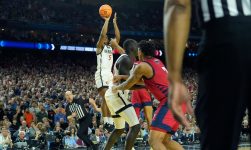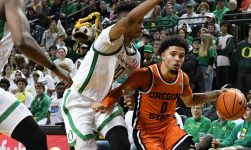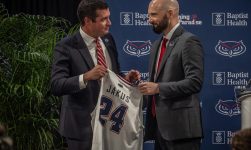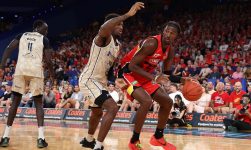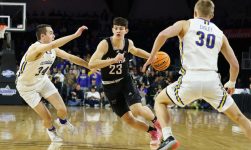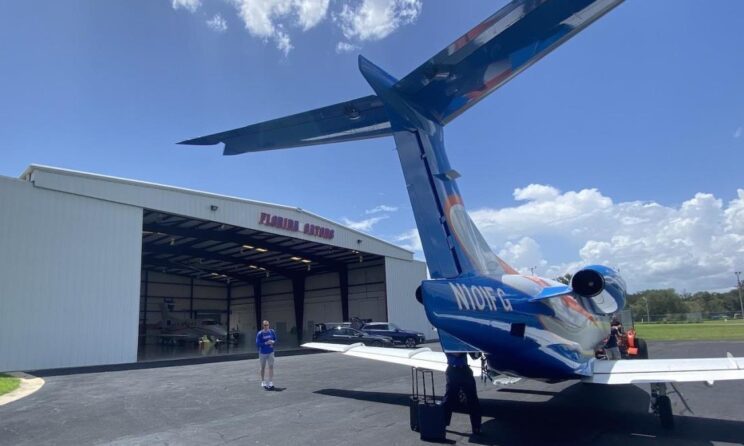
The second installment of our two-part series. CBS Sports was embedded with new Florida Gators coach Todd Golden and his staff as they hit the recruiting trail for five days in July. <strong>Read Part I.</strong>
Day 3: Gainesville to Atlanta to Augusta …
GAINESVILLE, 6:37 a.m. — The Army-green Dodge Charger is right on time. Florida player development assistant Jordan Talley scoops me up en route to campus. He’s calling players to make sure they’re awake. The 7 a.m. lifting session is minutes away.
Alex Fudge, a sophomore transfer from LSU, is next. No answer.
“Uh-oh,” I say. “He didn’t pick up?”
“No,” Talley says. “But I know just what to do.”
Talley calls Fudge’s roommate, Will Richard, who always picks up. No cause for alarm: Richard says Fudge is already at the gym. Florida’s campus is sleepy. The morning air already borders on swampy, though not yet oppressive enough to preclude a few cardio fiends from getting in a jog.
Most of the team is at the facility by the time we walk in. In the training room, Myreon Jones receives treatment. As I head into the weight room, strength coach Victor Lopez seems perplexed. Who is this person in my gym at 6:50 in the morning?
Lopez, 36, came to Florida via San Francisco with Golden. The weight room splits the practice facility in half. You can already hear voices reverberating over shoe squeaks and basketballs; the women’s team began practice at 6 a.m.
“You ever see a basketball player at 5 a.m.?” Lopez asks. “The walking dead, bro.”
Golden appears with his 6-year-old son, Jacob, a few minutes before the clock hits 7:00, and once it does, they’re off and running. Literally. Lopez’s voice booms off the padded walls. Taurean Green, the director of player development in his first season with his alma mater, emerges with coffee in hand. He came back following a year with the Chicago Bulls in player development under Billy Donovan after finishing his pro career in Poland.
Some quick cardio, then the team shifts to the weight room where they rotate between bench presses, body saws, band pull-aparts, knees-over-toes lunges, straight-leg calf raises and banded bicep curls. At the back of the room, BabyDrill’s “32 Freestyle” is booming on the stereo at the BRADLEY BEAL FUEL BAR, a nutrition station loaded up with drinks and snacks.
Someone on the women’s staff greets me as “coach.” They’re halfway to the dumbbells before I can explain myself. These are the joyous days. The Gators are 0-0, and there’s not a game in sight.
The session closes with three players at a time hopping on “Echo Bike” fan-powered cycles in the middle of the practice court. They pedal as fast as they can in 30-second bursts, their heartbeats monitored by special tech they wear against their back and chests. It’s all smiles, laughs and encouragement until guys start fading fast given how much exertion this competition takes at the end of an hour’s workout.
Fudge is leaning over a trash can after his third turn on the bike. He might vomit.
“If you got to, do it,” Green tells Fudge. “That’s what it’s there for.”
By the end, the guys are exhausted, hunched over on bikes or supine in the court. The workout wraps at 8:02 a.m.
Golden went 57-36 in three seasons at San Francisco before getting hired on March 18.
Jordan McKendrick, Florida Athletics
Georgia’s calling. This will be our busiest day.
Good news when we arrive at the airport: We’re taking the big plane. Before accounting for fuel weight, the Embraer Phenom 300 is approximately 11,500 pounds. It seats as many as 10 people, pilots included, and can fly as fast as 520 miles per hour. New pilots today. Say hello to Clint and Greg. Greg says he’s excited to make his first unsupervised flight as a pilot. I flash Greg a look. Greg laughs. Greg’s done this to strangers hundreds of times before, and it never gets old for him. We’re off the ground at 10:01 a.m., 328 miles from Atlanta.
ATLANTA, 10:58 a.m. — A humongous black Chevy Suburban awaits us at Cobb County’s private airport. It’s a 5.6-mile ride to the gym. Assistant Kevin Hovde is alongside again, meaning Florida is “flying the flags” in Georgia, California and Illinois today. Golden’s plan is to watch seven games in the next 10 hours in Atlanta and North Augusta, South Carolina. (This mission will partly fail.)
Golden will watch prospects from the 2023 and 2024 classes, a couple of those players being higher-priority guys from Florida. This Marietta, Georgia, event is primarily attended by mid- and low-major coaches, but that doesn’t mean a thing to Golden. His targets are here. It’s a hot gym on a hot day, four games at a time.
“This guy’s probably a little below our level, but we have to monitor him,” Golden says. “[Another school] is on him and wants him. We want to make sure we’re not missing something. We like him and think he’s good. It’s one of the trickier parts of the job. This kid is good, but you can’t take everybody.”
Collectively, the staff has seen the prospect more than 10 times in person.
“We’re going to have to pass on some guys knowing we’ll have to play against them,” Golden says.
Another game features a few prospects whose talent is blatantly obvious. Florida is heavily involved with one and figures to soon be just as involved with another.
“If he has a great attitude, I just think we try to take that one,” Golden says. “Pro talent.”
It’s in this game where Golden perks up, given there are multiple prospects who fit his picky prerequisites for scholarship material. There’s only two SEC coaches and one ACC coach in this gym. Florida could be sitting as well as any other program recruiting these guys, at least for now. Coming to Atlanta wasn’t always a lock, but it’s clear Golden believes the detour was worth it.
Meantime, another prospect is in need of some work. He never gets fouled, never drives, settles for pull-ups frequently. Too volatile and too dependent on shooting. Some prospects invariably move up and down a coach’s priority list as July wears on. He seems like one of those prospects.
“Two out of those three were good enough,” Hovde says about one of the games they watched.
“I think [the third player] gets there,” Golden says. “He can make plays with the ball in his hands.”
Before we leave, they make sure there’s no one else to check in on at this tournament. There is one player, but the schedule is too tight. Golden might fly back here tomorrow.
“That’s obviously not a big-time tournament, but for us to be there is important to them,” Golden says.
He’s able to leave this event, drive to the airport, fly to Augusta, Georgia, and be wheels down in 61 minutes. The Gators are officially moving with authority.
Golden and Hovde watch games at Super 24, an event that isn’t sponsored by a major apparel company.
Matt Norlander, CBS Sports
NORTH AUGUSTA, S.C., 3:30 p.m. — Peach Jam is packed and there are no roster packets. Golden and Hovde are initially flying blind, but coaching friends come through in the clutch and send roster photos via text. The Peach Jam seems to get more crowded by the year. It’s far and away the biggest event in college basketball recruiting. Despite renovations to this complex more than five years ago, it still feels like it’s outgrown the building.
With Peach Jam’s schedule being so public and some (but not all) Florida’s recruiting targets here being known by competing programs, I’m mashing all the evaluations together as to not give away what they’re thinking about specific prospects. Some reports are wonderful, others not so much. It’s a fine line to walk; they don’t want to let the prospects know exactly what they think right now if the reviews aren’t good.
One player they watch is a letdown. He was an evaluation as opposed to a monitor. (Monitoring, generally, means Florida is interested and either has a scholarship offer extended or feels it is too soon to do so.) Another player Hovde describes as “kind of weird;” he isn’t sold on him. Still, “I might shoot him a text.”
There’s another game Golden was supposed to watch only to discover the player he was supposed to see has a sprained MCL. Apparently, that wasn’t relayed to anyone on Florida’s staff by the player’s coach. It’s understandably irksome. Golden and Hovde decide to split up and cover more ground with more games, never knowing what might await. These are all surface-level evaluations. Golden swaps conversations with a few familiar coaching faces. One target they watch is promising. Overall: no grand takeaways, probably no future Gators. A look at the night’s final few games doesn’t offer up much to chase. Another team they were expecting to watch isn’t even playing. It’s going to be an earlier night than expected.
“The way most people think about recruiting now is so outdated,” Golden says. “You don’t have to be in the gym from 8 a.m. to 10 p.m. every day of the live period.”
Be there for the players you want, basically. Golden and Hovde are out of the gym by 8 p.m. After FaceTiming in the car with his wife, Golden recaps the day before springing this on me: “There’s an outside chance we’re going to Chicago tomorrow.”
Thomas Haugh, Florida’s lone commitment in the Class of 2023, has continued to play well, and so has his team. If they win one more game, they’ll be in the Under Armour title game. We won’t have that answer until Saturday morning. An informal itinerary is built out to be ready for either Atlanta or Chicago for Saturday afternoon.
Florida owns two private planes and has an annual recruiting budget of $325,000.
Matt Norlander, CBS Sports
Day 4: Atlanta or Chicago?
AUGUSTA, Ga. — I meet the duo at 8:54 a.m. in the parking lot of their hotel, and as Golden gets in the car, Hovde cues up arguably Counting Crows’ best song, “Mrs. Potter’s Lullaby.”
We’re off to a great start.
We head back to the Riverview Park Activities Center, just over the Savannah River that carves Georgia from South Carolina. Today’s Peach Jam itinerary is light. Three games max before flying to Atlanta or Chicago. One game is attended because the staff has relationships with a Nike-funded program and they need to show their face. At another game, there’s a player whose tempo-free numbers (which the Florida staff can extrapolate and track with EYBL stats based on ~500 possessions worth of data) is crazy-good. Even though this player is a 2023 prospect, it’s too soon to know if Florida will wind up as one of his primary interests. On Florida’s end, they don’t even know if he’d be in the top four or five on their list.
After watching him play again, Golden and Hovde are unconvinced. Not explosive enough, probably a level below Florida’s aim.
“A little maxed out,” Hovde says. “Small, not much upside. But he’s pretty good. His body’s not going to get much better. His body’s already strong. Sometimes, you see a 6-4 skinny kid who’s a late bloomer.”
That’s not the case here.
“We’ll keep watching him, though, see how his year goes if he doesn’t sign early,” Golden says.
You might be surprised to learn just how long and uncertain recruiting with many prospects can be. Everyone is wired differently, so one player’s way of communicating might not reflect the reality of their interest, or vice versa with a coaching staff. Learning to live with that unsureness is a contributing factor to being better at the job.
As the morning moves along, word comes in: Haugh lost. Chicago is off. Atlanta wins by default. Golden catches up with his old boss and good friend, Bruce Pearl, and they talk about expectations for the SEC next season. Golden also tugs the ear of SEC director of officiating Mike Eades, who’s here to oversee and mentor Peach Jam’s referees. Soon enough, there’s not much else to draw from at Peach Jam for Golden.
They decide to keep Hovde behind for the afternoon at Peach Jam, while Golden will take the plane back to Atlanta. In the car on the way to the airport, Golden shows Hovde a highlight of Haugh on his phone before giving Haugh a call. It lasts all of a minute, but Golden gets across his point. Just then, Gators assistant Carlin Hartman calls Golden to relay what he saw late Thursday night out in Los Angeles.
“And that’s why he’s a non-take,” Golden says of one of the seven players Hartman is watching. One of those razor perceptions that cut just a little too deep.
Florida is monitoring eight-or-so prospects in the Class of 2023 alone. The number is fluid because some evaluations aren’t final. In the coming weeks, Florida’s 2023 list is probably going to shrink, just as other power-conference schools will see their board of targets diminish.
While Golden plans to prioritize the transfer portal every spring moving forward, the emphasis on high school recruits will center around how Florida has attracted All-SEC talent in the past. Part of Golden’s job pitch was acknowledging that, in most years, the state of Florida has high school prospects with NBA potential. There must be a premium on landing the best prospects in the Sunshine State.
Golden is seeking to get UF back to being a “second- and third-weekend program,” referring to where they would finish the season in the NCAA Tournament. When he landed in Gainesville in March, only two guys on the roster were from Florida: All-SEC talent Colin Castleton and walk-on Jack May, the son of former Florida assistant Dusty May.
“It wasn’t super complex, just building a fence around the state of Florida, recruiting the backyard and doing a good job up and down the East Coast,” Golden says.
Golden did a deep dive on the past 20 years of the program and discovered that most of its best teams the past two decades had players either from Florida, its nearby states or through Philadelphia, St. Louis, Virginia, Tennessee and New York.
With Haugh off the board, Florida has two open scholarships for 2023. At most, one more is going to a high schooler.
“We won’t take any more than two or three freshmen,” Golden says. “There’s not anyone right now that we have to do everything we can to get this guy in the 2023 class. That’s not to say we won’t take anyone in the 2023 class, but I think we need to be super-picky.”
Florida has only three players with no eligibility remaining after this year: Castleton, Jones and Kyle Lofton. There’s also the unknown math of whether anyone else will leave Florida from the current roster. It’s not what anyone is hoping to go down, but odds suggest at least one more player will transfer. That will open up a spot for either a high school recruit or a transfer. Understanding the state of your roster and keeping this in mind on a weekly basis has become a function of survival in college basketball coaching.
Hovde, left, and Golden arrive at Peach Jam on Friday morning to evaluate more prospects.
Matt Norlander, CBS Sports
We’re dropped off by Hovde at 1:26 p.m. Pilot Greg awaits curbside to walk us to the plane. Golden is heavily working the phones to get the latest on how guys are playing, who they’re recruiting against and how the remainder of the weekend is shaping up.
“There’s no way [name withheld] is going to [SEC school], is he?” Golden asks the other voice on the phone. “I don’t know what he is. He’s a wing right now. He’s not a point guard. Not really even a guard.”
Fifteen private jets are parked on the tarmac in Augusta, but it’s about to be 13. Florida’s will be off the ground in minutes, taking off 60 seconds after Arkansas’ plane gets in the air. Right before we take off, Greg and Clint triple-check to make sure they’ve got the right destination. They do. Less than 13 minutes after getting to the airport, we’re wheels-up. Thirty-three minutes later, we’re back on the northwest side of Atlanta and making a beeline for the same event as Friday, the Super 24.
MARIETTA, Ga., 2:35 p.m — Golden was hoping to get here in time to watch one player he hadn’t seen yet, but his game is already done. No matter, the real reason we’re back is the reason why a Big Ten, ACC and SEC school are also in the building. Yet again, some Gator targets play well. Scratch that: They look tremendous. One 2024 prospect looks borderline good enough to be a reserve on Florida’s bench right now. This event is maybe a twentieth as attended from a coaching perspective as the Peach Jam, yet there’s no shortage of future Division I players here.
Golden also has to get eyes on another prospect he’s been told about by his staff. We walk to the other gym, and there’s only one other power-conference coach (Golden figures he’s here for the same guy) among 15 total I count sitting, a few of whom aren’t from D-I schools.
Within 5 minutes and maybe 10 possessions of watching, Golden might be out entirely.
“Quick reaction is a no,” he tells me. “College basketball is more of a system game and so … it’s hard for me to get excited about a guy who needs to dribble 7-10 times to make a play. In college, that just won’t work. If he needs to bounce it eight times to get by his man, it’s not realistic that will translate. His athleticism is lacking. I would say he’s a mid-major prospect.”
Golden recruited mid-major prospects for the past five seasons. He has an eye for it. Nothing against the player, but that’s just the evaluation. He got a tip, said he’d check him out, watched him and quickly determined and this young man is never going to wear Gators threads.
Another prospect here remains a monitor-at-best situation. But the staff on the whole is inspired by a few prospects who made their talent clear over the past two days. Hovde will be making the drive up here in a few hours, so Golden has a choice: stick around and watch some more bad basketball or be a good husband. He’s seen everyone at three sites and two time zones he needed to see, many of them multiple times. Seventeen games, more than a dozen targets or would-be targets in four days.
Today is his wife’s birthday. He’s got the plane. He can get back just barely early enough to surprise her and his children. Florida still has three assistants on the road, and he’ll be available as needed for the remainder of the night. It’s time to go home.
Golden’s traveled approximately 3,000 miles (2,979 to be exact) over the past four days and is shutting his travel down for the final 23 hours of the live period.
GAINESVILLE, 6:45 p.m. — Golden is making his way through town when the thing coaches hope for at this time of year happens. An unprompted text comes in from one of his most coveted recruits. That’s a win. A few minutes later, he gives him a call. The player doesn’t pick up. Two minutes later, the prospect calls back.
“Hey, coach!” he says. Turns out he was in the security line at the airport.
“Are you guys going to Vegas right now?” Golden asks.
“Yeah.”
“You guys are some ballers, dude,” Golden says. “This is the summer that never ends for you. You’ve played like 9 million games.”
The player seems just as enthused to talk to Golden as Golden is to talk to him. It’s a quick look at the courting nature of recruiting. The way Golden’s talking to him is not the way he’s been talking to me or his staff. Understanding how to talk to players can give coaches an edge. At 37, Golden uses his age to his advantage. He also asks when he can link up with the player’s parents. He wants to arrange a meeting so they can plan on an official visit later this year. The player seems all for it. It’s just the thing Golden was hoping for to put a bow on the day.
Florida’s coaches collectively traveled more than 15,000 miles on private planes, commercial flights and car rentals over five days.
Matt Norlander, CBS Sports
Day 5: The summer so far
GAINESVILLE — Hartman wakes up in Chicago, Jonathan Safir wakes up in Los Angeles, and Hovde — supposed to be in Atlanta overnight — wound up catching a late flight back to Gainesville after a team he was supposed to see bailed early from their tournament. An oft-repeated maxim in this business is there are almost no guarantees in recruiting. Sometimes you learn the hard way. Hovde probably didn’t even need to make the drive to Atlanta at all.
Big picture, Golden and his staff seem no closer to knowing, among the dozen-or-so players they evaluated in the past four-plus days, if any are more likely to eventually commit. They can hope, maybe try to convince themselves, but right now they truthfully don’t have those answers. Hartman gets back to Gainesville late on Sunday night and we meet up for a ride around town. He’s the heart and soul of this staff. He feels good about his trips to Los Angeles and Chicago and tells me there were players available with immense potential.
For how many will Florida be able to remain in contention? Golden, like every other coach, hates finishing second.
“It’s about the value of scholarships,” Golden says. “You only get 13 of them. The recruiting model is outdated. We’re not going to be looking at recruiting like a lot of other programs. I feel, at the level of our program, we don’t need to bring in guys just to bring them in. We’re not going to do the usual of all these visits in August and September, commitment from players in November. We can be thoughtful into the fall. We can wait until the spring to fill out our roster.”
Around college basketball, some have been skeptical of Golden getting this job. It’s not an overwhelming sentiment, but it’s out there. He inherited San Francisco from Kyle Smith and then undeniably did a very good job there. Obviously, there is a huge gap between leading a WCC program and being tasked with running Florida. On top of that, he’s trying to do it in a way that’s never been done at this school before.
“At [SEC school] they’re hunting freshmen,” Golden says. “They think that’s the value. Get freshmen and develop. That’s the exact opposite of how I look at it. I don’t want to try to project how good people are going to be. It’s not an exact science. There’s not one guy I feel we’re actively recruiting and trying to sign them right now, which is unique.”
Over five days with Golden, it never seemed like the task was too big or the unavoidable pressures of this job were moving alongside of him. Then again, he’s yet to coach a game, and it’s the middle of the summer. Coaches are a drastically different species in July compared to what they become in the middle of a league race in late January.
The staff will meet again Monday morning. Good news is coming: Two coveted targets will inform Golden that they’re booking their official visits. And another player, the one who called Golden from the airport on his way to Las Vegas, he’s coming later in the fall, too. These are players who, if they commit, could alter the trajectory of Florida’s program. Given how much expectation is attached to major jobs in this era, it’s also not a stretch to say this next class might prove vital to Golden’s long-term viability at UF.
You could easily build an argument that understanding how to bring in talent — but then knowing how that talent fits as a collective — is the single biggest factor to lasting as a head coach in this sport.
If you came to this story looking for hasty resolutions on Florida’s program, sorry, that’s not this staff’s objective. They refuse to force it. Though he doesn’t say it explicitly, it seems Golden is determined not to mishandle the energy that comes with getting this job so young.
At 37, he’s the second-youngest coach of a power-conference program. (Duke’s Jon Scheyer turns 35 in August.) Golden is as enthusiastic a head coach as you might find anywhere in the SEC at this point, but he’s got the patience of a monk. He’s developed a reputation for being analytically savvy (like many, he also does the daily Wordle), and he doesn’t shy away from that image. It means consistently putting trust in things beyond your own instincts.
That’s a personality trait that can sometimes cut against the nature of coaching. But it’s exactly how Golden is determined to build up Florida’s program and to bring it back to sustained national relevancy.

